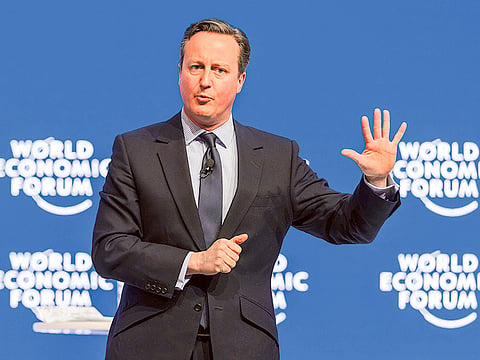Cameron challenges European leaders on reform
Cameron needs quick agreement so that he can hold the referendum before summer

Davos: British Prime Minster David Cameron used his speech in Davos to challenge his fellow European leaders to agree to his proposals for reform at the February 18 meeting of the European Council.
Cameron presented himself as a passionate European but rejected the idea that the EU is a “single currency club or a political union” as he argued that he wants “a secure future for the UK in a reformed EU”.
Cameron needs a quick agreement on the proposals so that he can move on and hold the referendum he has promised before the summer, which would remove a lot of local uncertainty in the British political scene, and would avoid any referendum later in the year being dominated by a new refugee crisis in the summer.
Britain got some interesting support from people like French Prime Minister Manuel Valls who told Davos that “it would be a tragedy if Britain left the EU”, who was joined by senior leaders from Germany, Greece and the Netherlands who all pledged to do everything to reach a compromise with the United Kingdom that would keep it as a full member.
German Finance Minister Wolfgang Schauble said that a British departure would be a disaster, adding that it would harm the EU’s standing in the world and any economic negotiations going on, if it could not attract one of Europe’s leading economies to stay in.
But clash is almost certain in Brussels where Cameron is seeking change in four areas of competitiveness, economic governance, sovereignty, and social security.
Cameron has wide support in his search for a more competitive EU, and he told Davos that the EU is lagging behind the US in technology and competitiveness and added that this needs to change. He advocates expanding the Single Market to include the digital economy, services and energy.
His second point is that the EU must make equal space in its thinking for members who are not members of the Euro. He said “I want the Eurozone to succeed and I encourage the Eurozone members to reform, but we need a fair balance in the EU between Eurozone members and others”.
His third point is that the EU has to be clear that as the EU deepens its institutions this should not be designed as a continual political merger of the member states into one huge state.
Cameron’s fourth point on migration hits at one of the EU’s most difficult current issues, which affects both refugees and the internal movement of EU citizens. Cameron is aware that coping with the refugee crisis is under separate negotiations so he has focused his demands for reform on limiting the access of new arrivals to the UK to the welfare system.
In response to these demands, Valls was joined by Dutch Prime Minister Mark Rutter in saying that agreement is not likely in Brussels next month. Cameron has been careful to avoid asking for changes that need amendments to the EU treaties, and was supported by Schauble who may have been talking to the Greek Prime Minister Alexis Tsipras but could equally have been warning the UK when he said that member countries need to abide by all their agreements, and asking all the national parliaments to approve any amendments to the treaties would be like “bringing a lit candle to a room full of dynamite.”
Sign up for the Daily Briefing
Get the latest news and updates straight to your inbox


